News & Event


News & Event
News & Event
The 1st R&DI Policy Data Colloquium
- Writer Chaerin Park
- Date2020-10-06
- Hit1,144
File
-
Download
 20201006100419.jpg
(224.68KB / Download 274회)
20201006100419.jpg
(224.68KB / Download 274회)
On Sep 25th, Korea Institute of S&T Evaluation and Planning (KISTEP) hosted ‘The 1st R&DI Policy Data Colloquium’, themed ‘Significance and Utilization of National R&D Research and Analysis Data Connected with Multisource’. This colloquium was aimed to share the expertise and research experience of experts on research innovation policy data, and to discuss the direction of data-based national innovation policy. Its progress followed a COVID-19 guideline, and this event was streamed online on KISTEP’s Youtube channel.
(Replay) https://youtu.be/BR5q07fy-ic
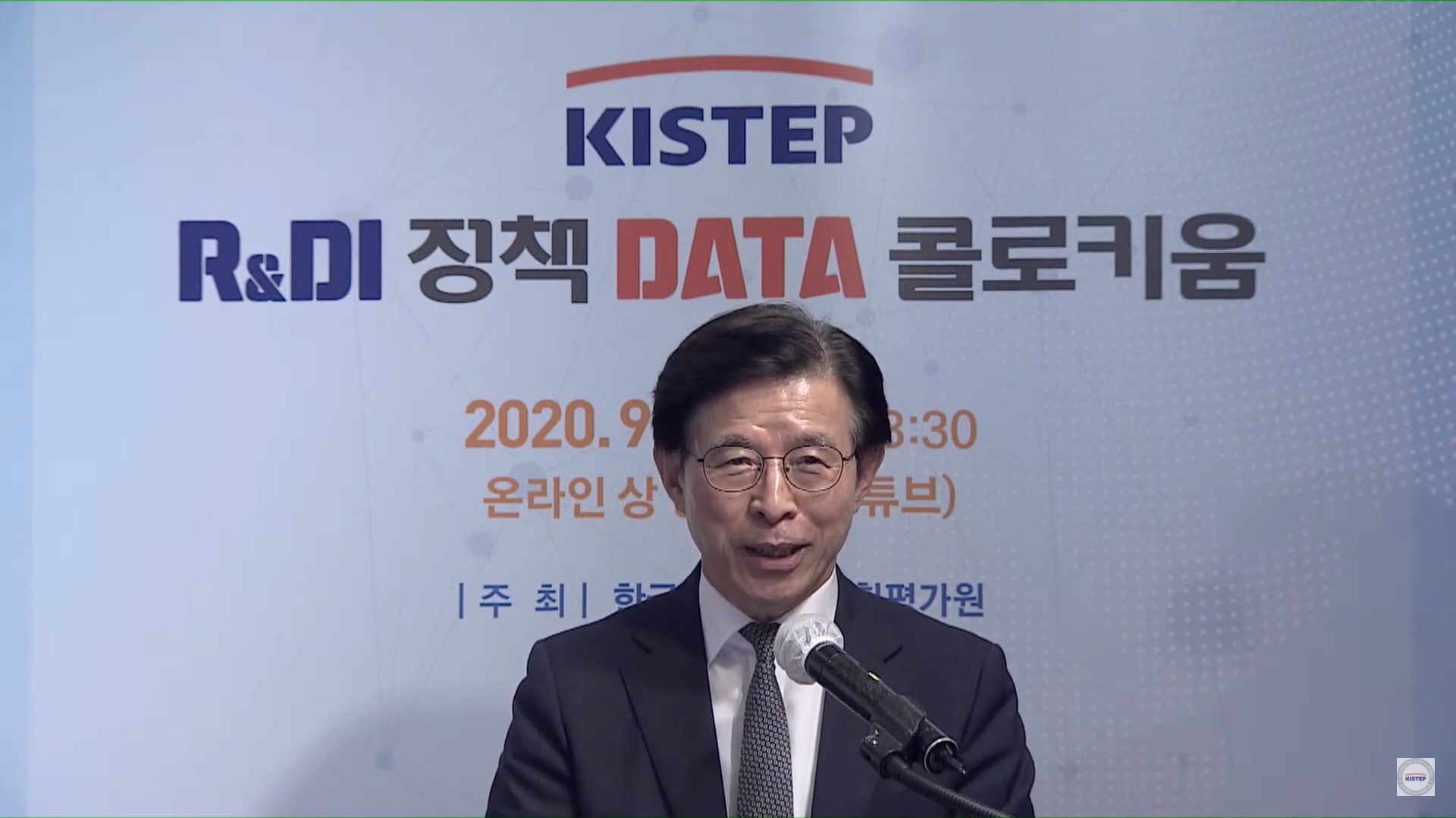
President Sang-seon Kim (KISTEP) addressed: “The topic ‘Data’ triggered by the 4th Industrial Revolution is explosively spread in the aspect of digital formation caused by COVID-19, so that KISTEP will contribute to the economic growth with higher utilization of R&DI policy data alongside government’s digital new deal.”
Director Yoon-bin Lee (KISTEP) delivered the keynote speech themed ‘current status and future of R&DI policy data’ to introduce one of KISTEP’s intrinsic mission, S&T policy data production.
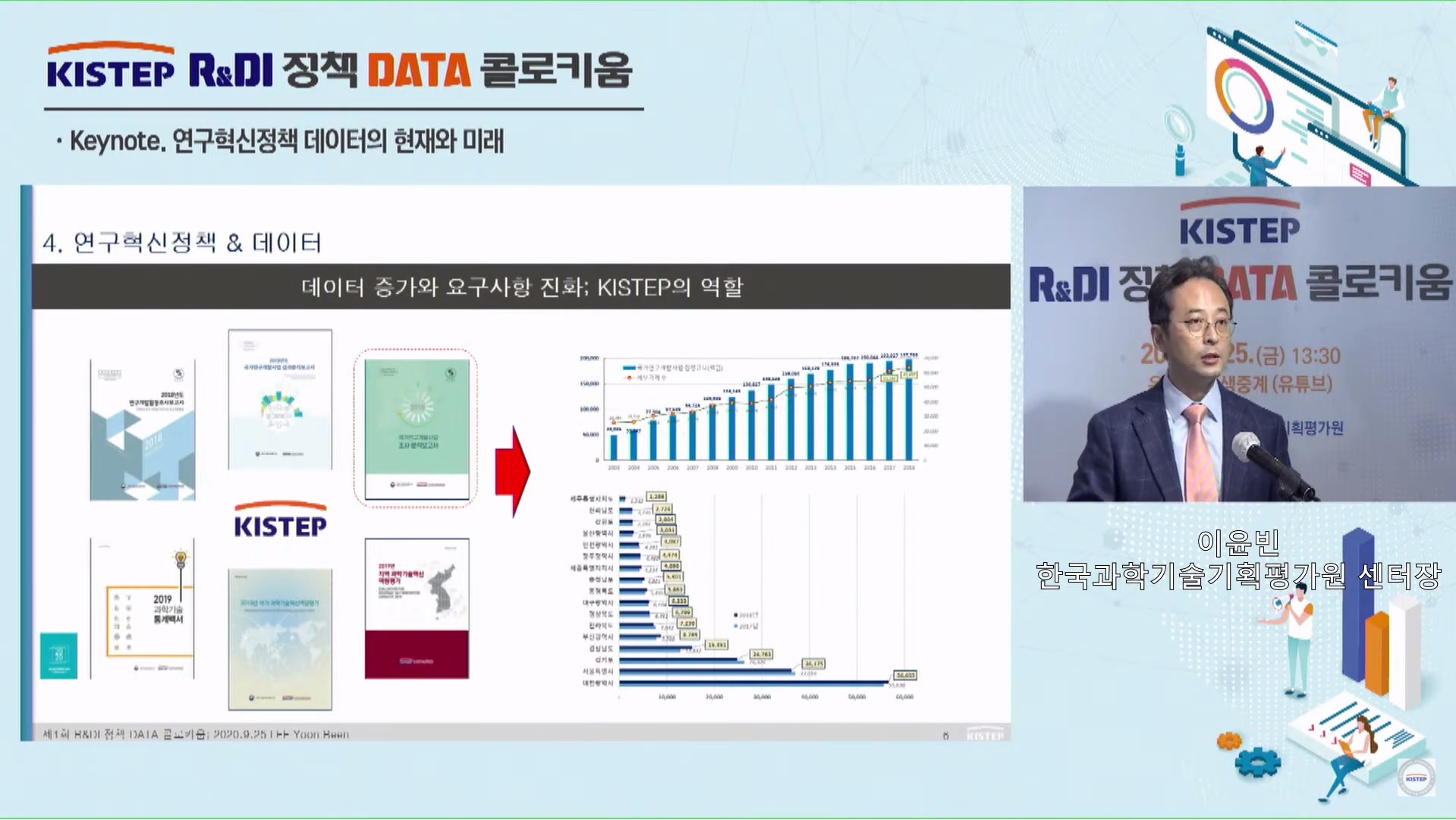
Director Lee (KISTEP) said that since the amount of data is increasing and demands on data is getting sophisticated, a perspective to utilize data has to be changed like creating new ways to establish data. Equally, he stressed we must not forget the basic premise that data has a limitation although trying to get cooperation with experts and institutions.
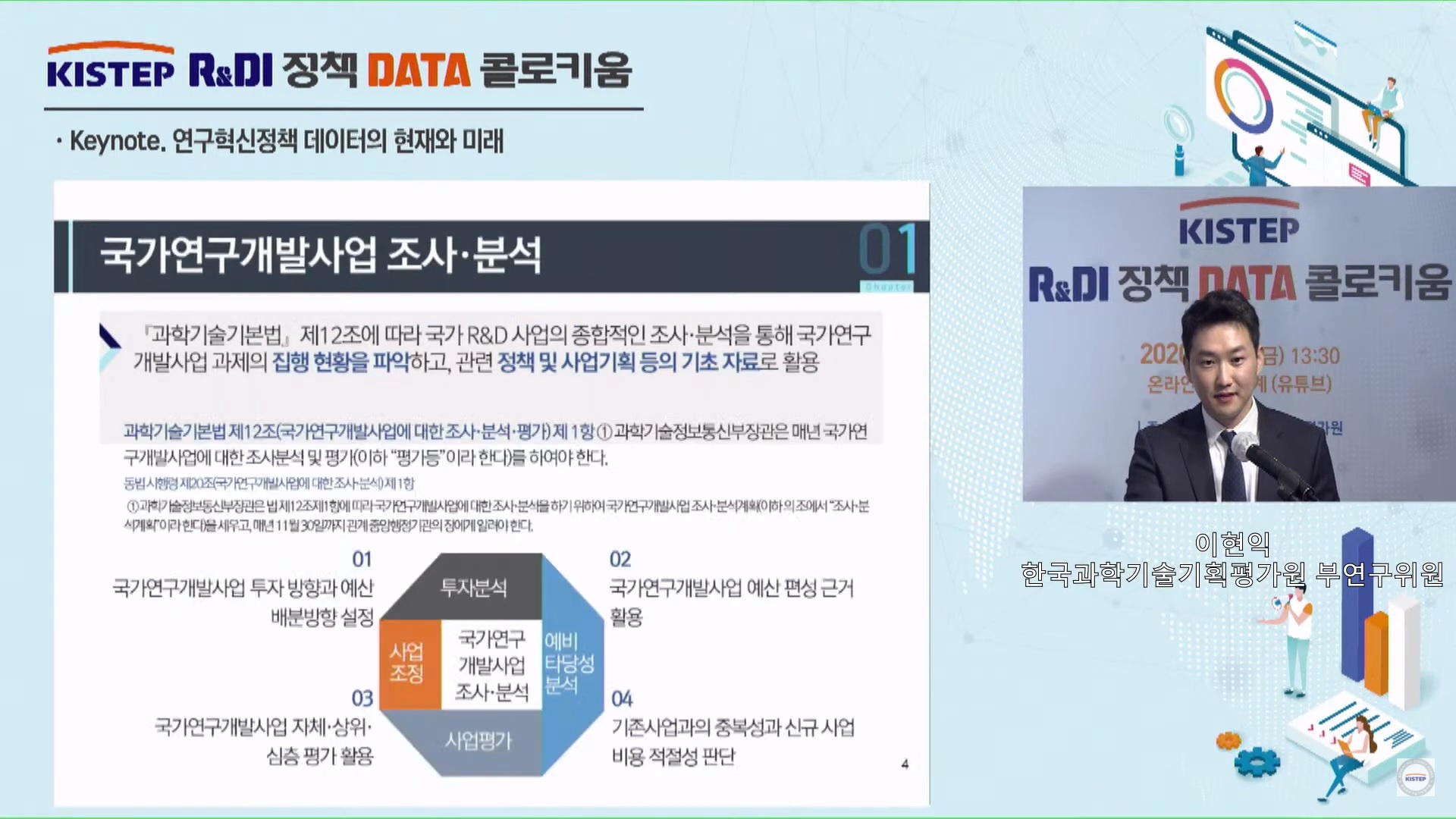
The following presentation was about ‘R&DI Policy and National R&D Investigation and Analysis Data’, which the speaker was Dr. Hyun-ik Lee, an associate research fellow from KISTEP.
The first main presentation was made by Seung-beom Seo (CIS), the head of Innovative Growth Finance Team, and its topic was ‘National R&D and Analysis of Linkage Effect of Policy Finance’. He introduced the result from demonstrating a correlation between national R&D and policy finance and companies’ growth of finance and employment through ‘IGS’ which means a platform for collecting and analyzing policy finance data of innovative growth.
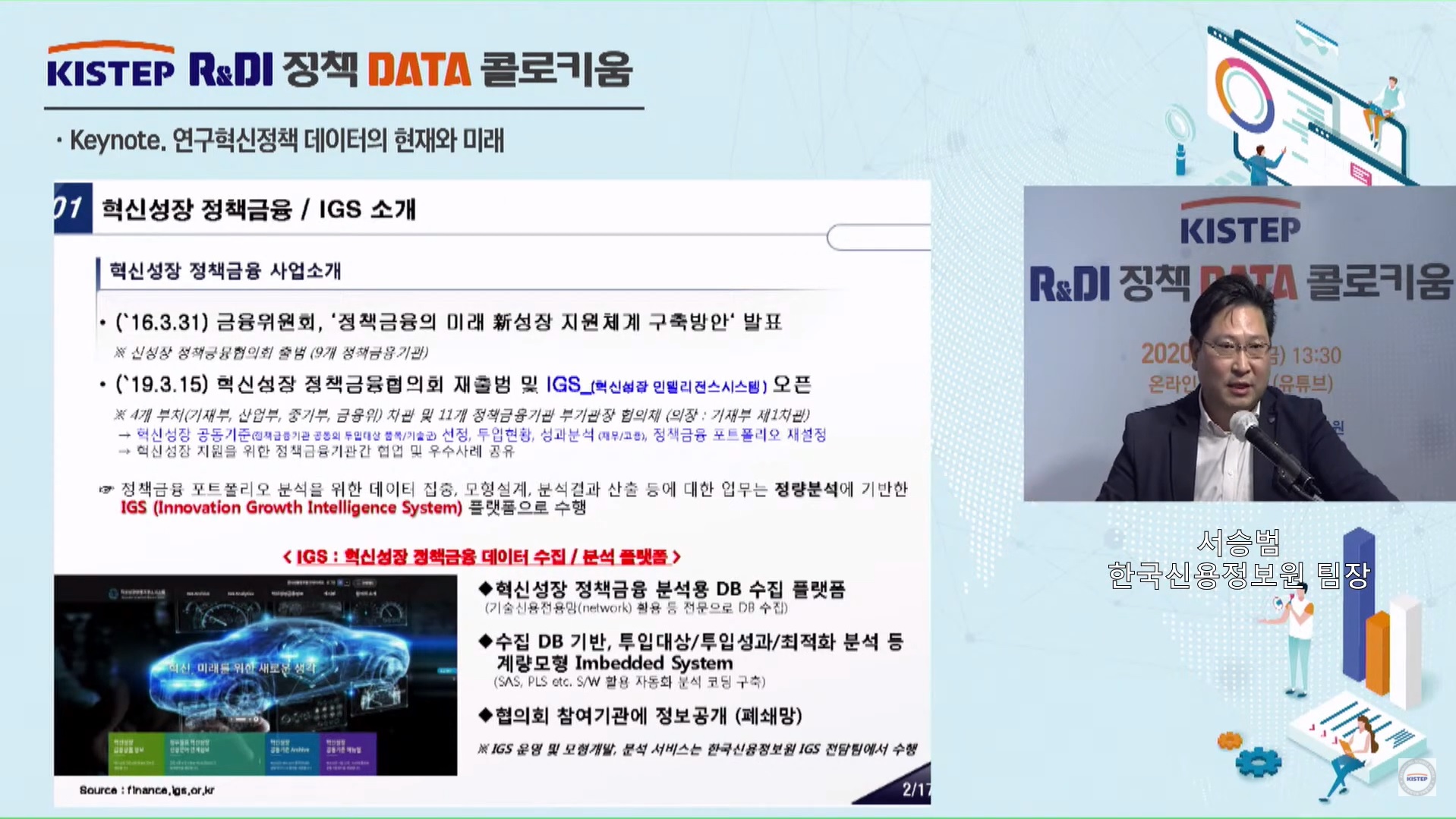
According to his presentation analyzing the data collected between 2017 to 2019, the business enterprises which conduct the national R&D with a governmental finance support have a higher rate of its growth about finance and employment, and furthermore, it shows that a governmental finance have a weak mediated effect between R&D and performance.
Secondly, Director Ji-hye Kwon (WISET) gave a presentation, themed ‘Statistics-based HRST Policy on Gender Equality’. She introduced that since the Act on fostering and supporting women scientists and technicians was legislated in 2002, the legal basis of supporting women in S&T was established, so related statistic research and supporting policy have been in progress.
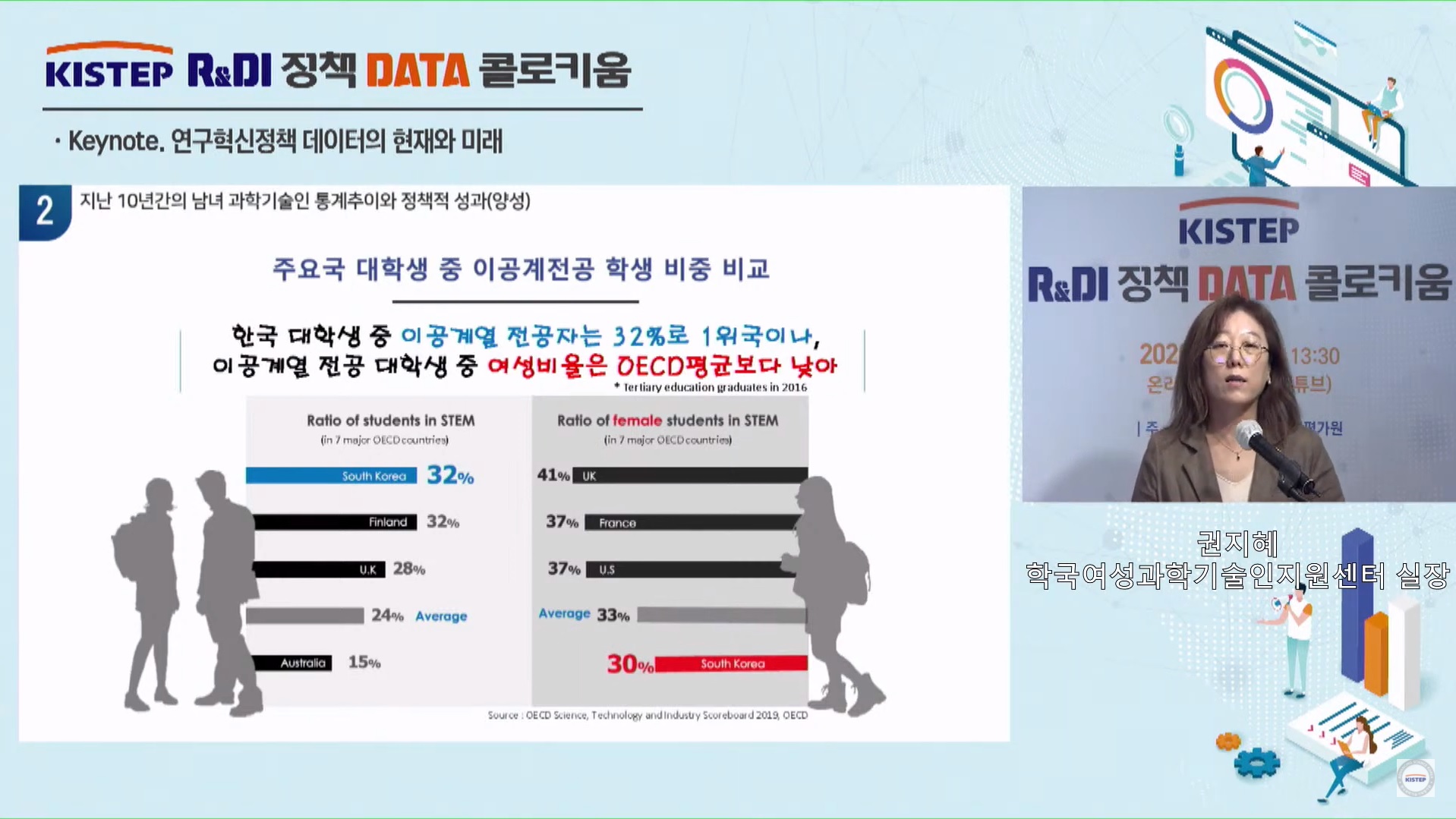
Director Kwon said since HRST policy is based on statistic data, supporting women in S&T policy has a correlation with statistics. In fact, WISET has established an infrastructure for fostering and utilizing women scientists and technicians based on the statistic data such as the survey of utilizing women scientists and technicians in 2005.
Lastly, Sin-hyuk Kang, the associate research fellow from KLI, gave a presentation themed ‘Effect of Governmental R&D Support on Employment’. He utilized the governmental R&D analysis data linked with an employment insurance database for the research.
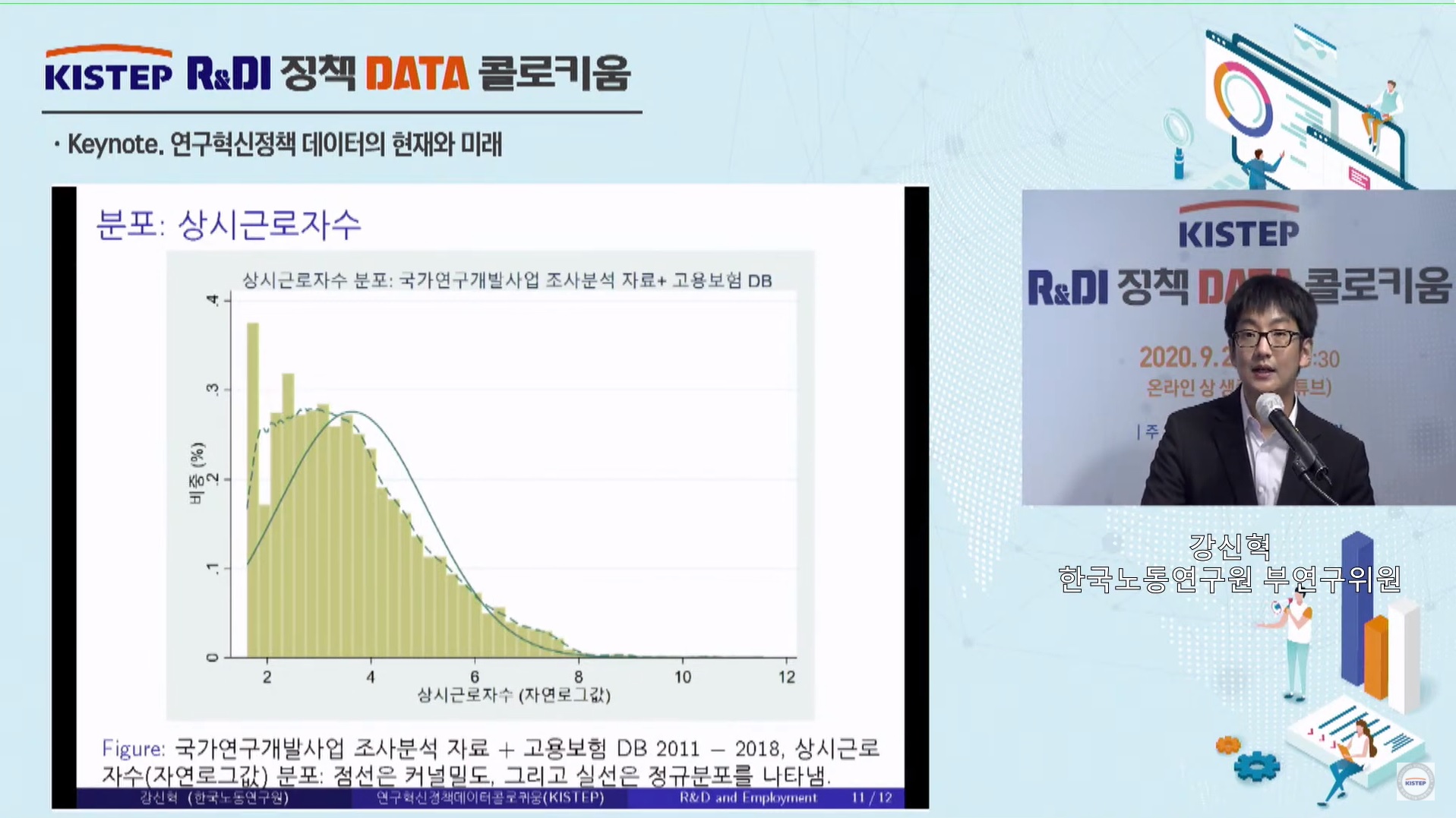
Dr. Kang said: “When analysing the governmental R&D policy, the governmental R&D analysis data linked with other administrative data is definitely precious and helpful resource, so it’s necessary to establish environment to connect various administrative data.”
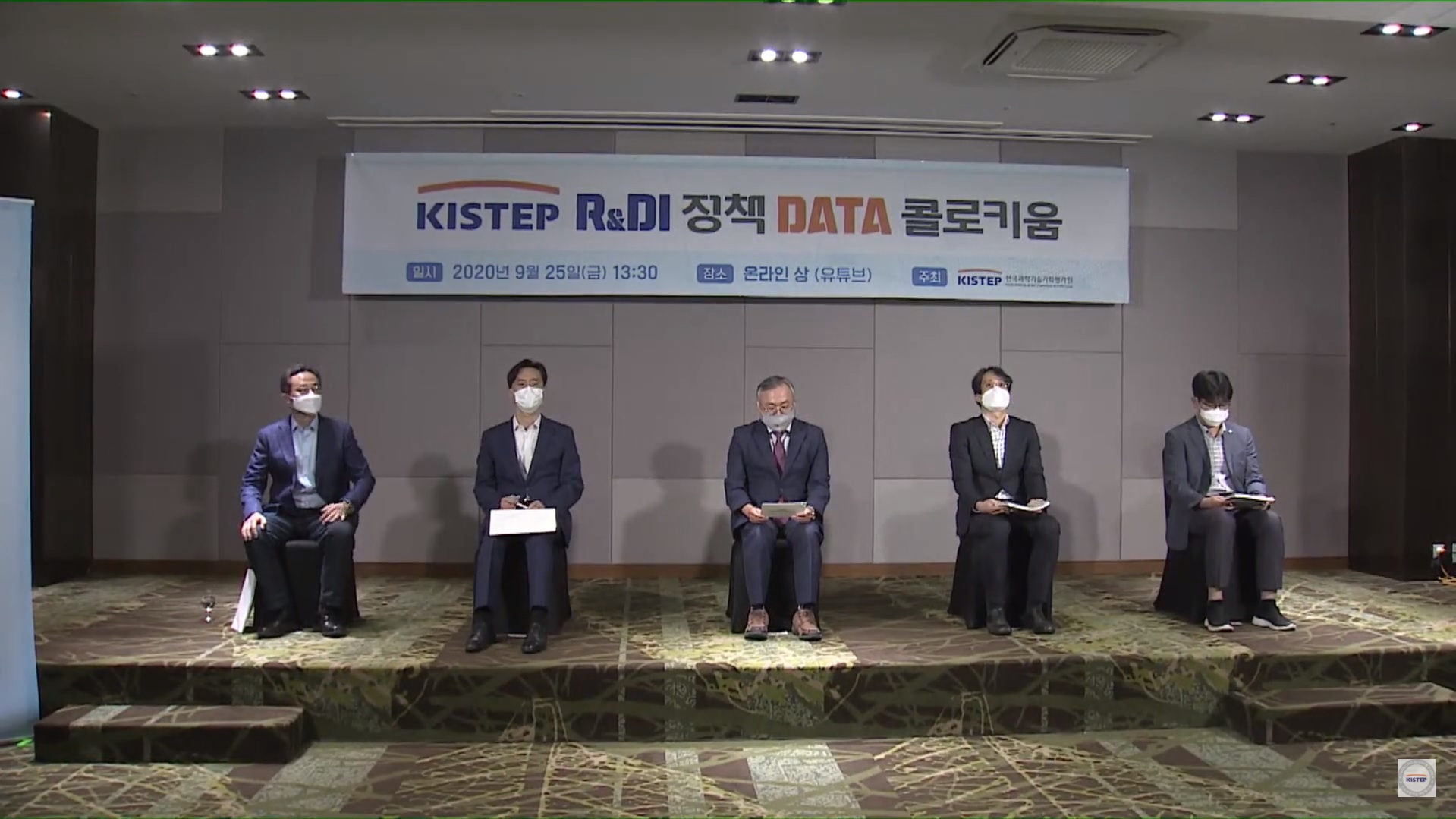
▲ (Panel Discussion) From left to right, Yoon-bin Lee (KISTEP), Professor Young-Kyoun Oh (Suwon University), (Host) Se-hong Oh (KISTEP), Professor Cheol-woo Baek (Duksung Womens University), Hyun-jun Jung (Korea Information Society Development Insitute, KISDI)
The following panel discussion, Se-hong Oh (KISTEP) hosted it and the panels discussed how to improve and utilize R&DI policy data.
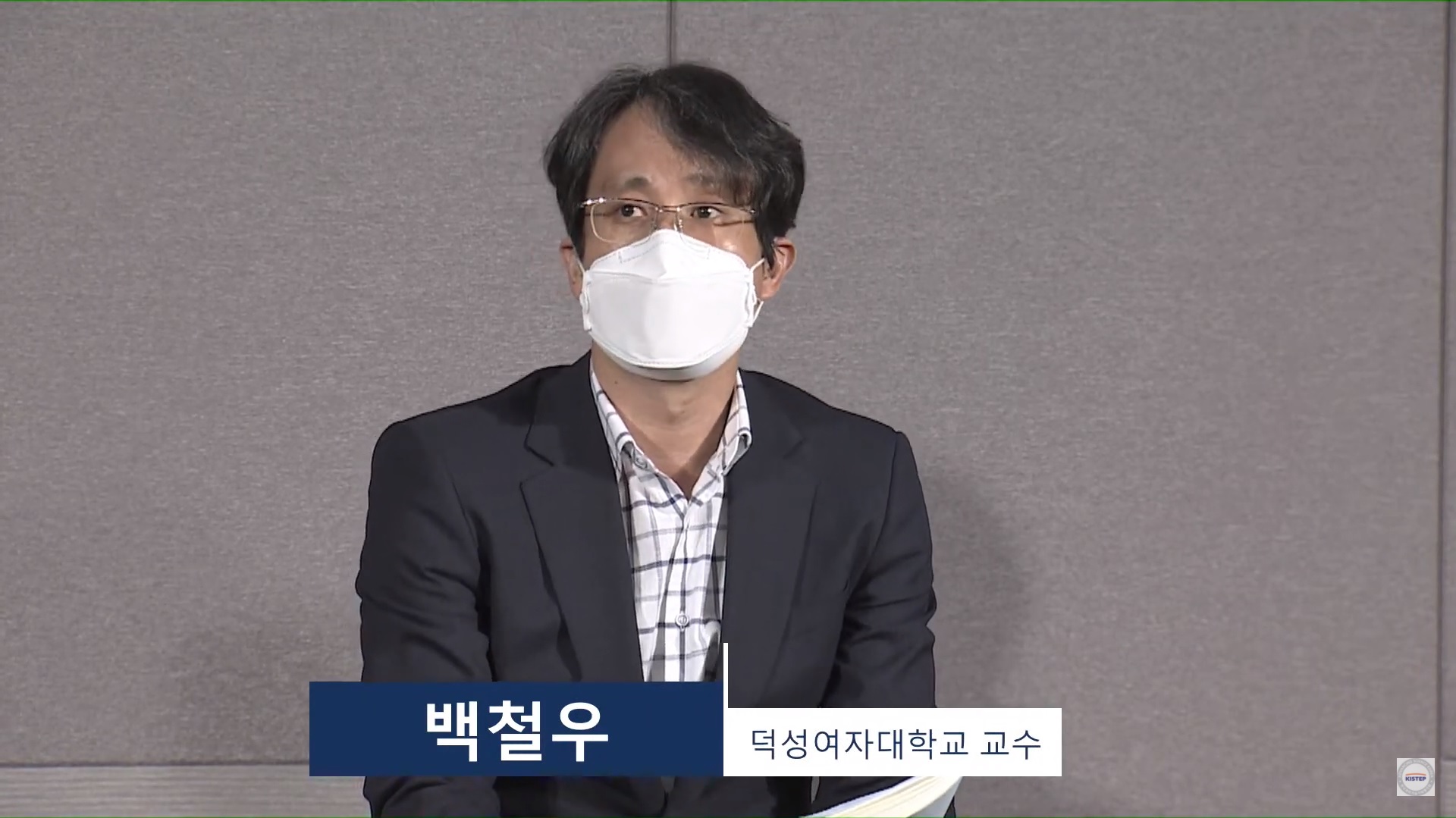
Professor Baek stressed a correlation between data, and he said: “There’s a limitation when using the only data, but if connecting a number of data, diverse analysis can be conducted, so it’s necessary to make a linkage strategy for sensitive resource with existing data benchmarking examples of related utilization.”
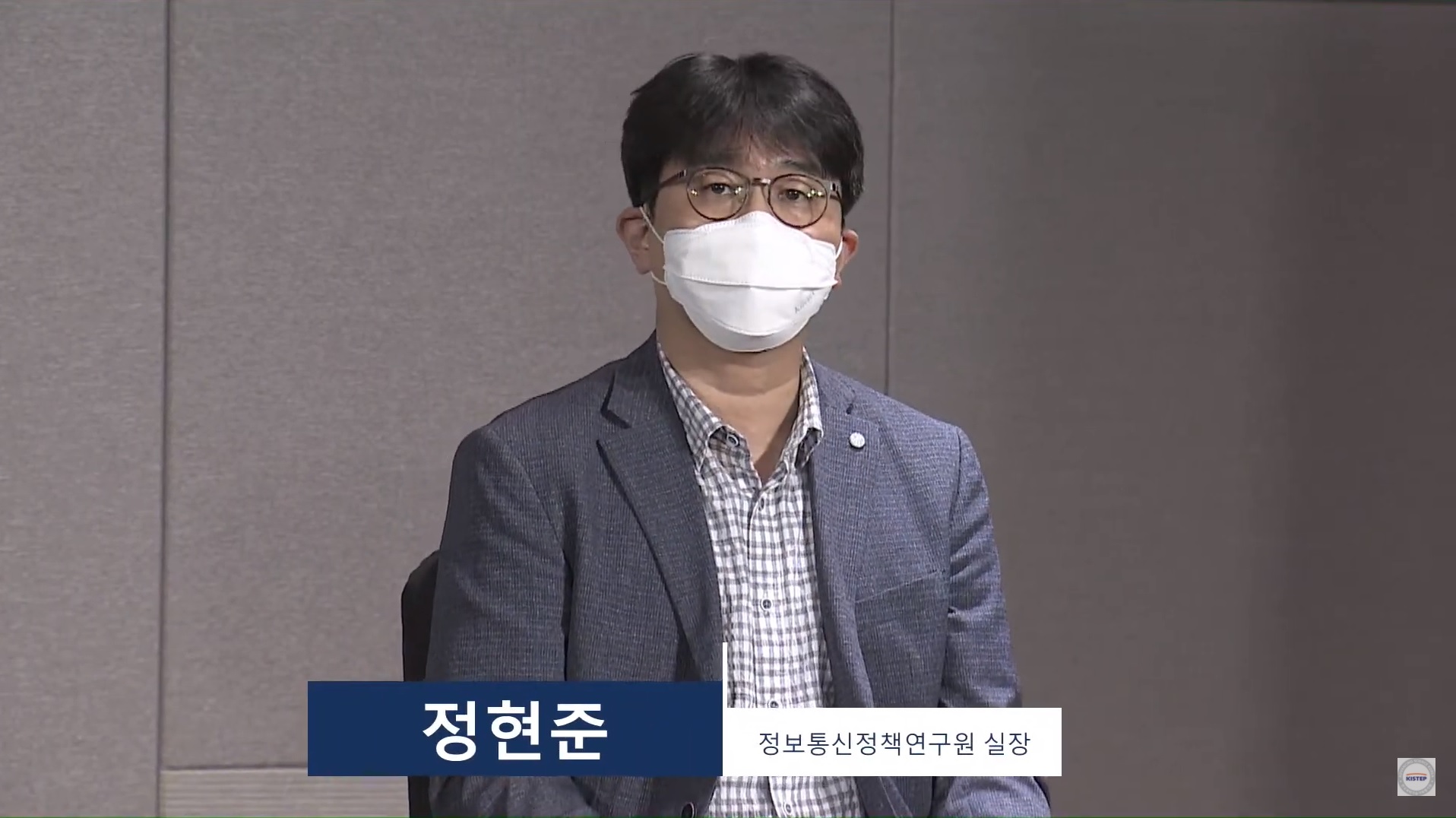
Director Jung (KISDI) highlighted the importance of data with his statement: In the era of 4th Industrial Revolution, utilizing data is not only a mainstream but a requisite. Moreover, he introduced the example of multisource-based statistic research conducted by KISDI, and he commented that data falls into 3 categories: microdata, administrative data, and bigdata.
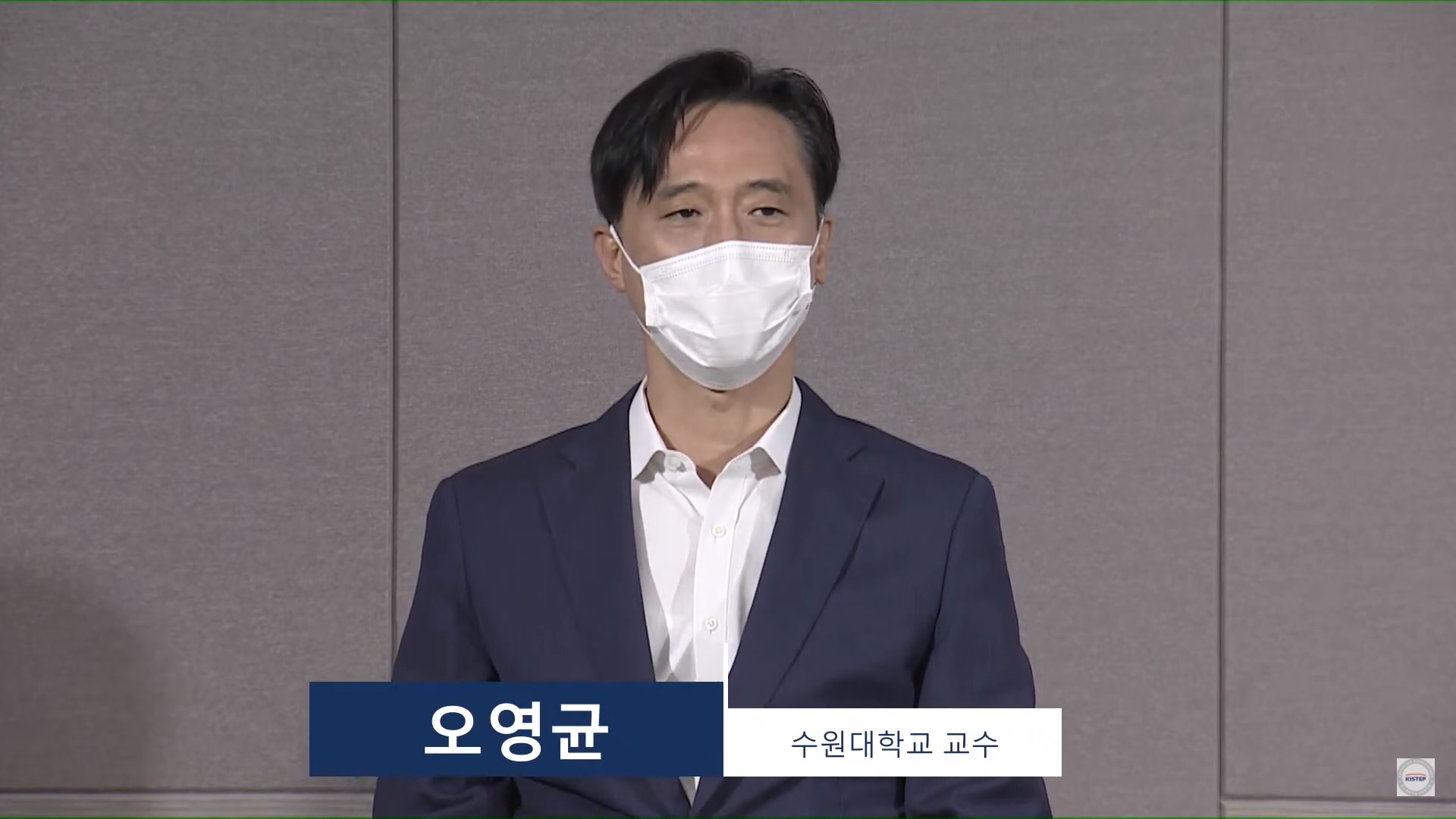
Professor Oh (Suwon University) pointed out the performance of S&T includes not only developing new technologies and improving a level of technology but also the added value generated by utilizing S&T data.
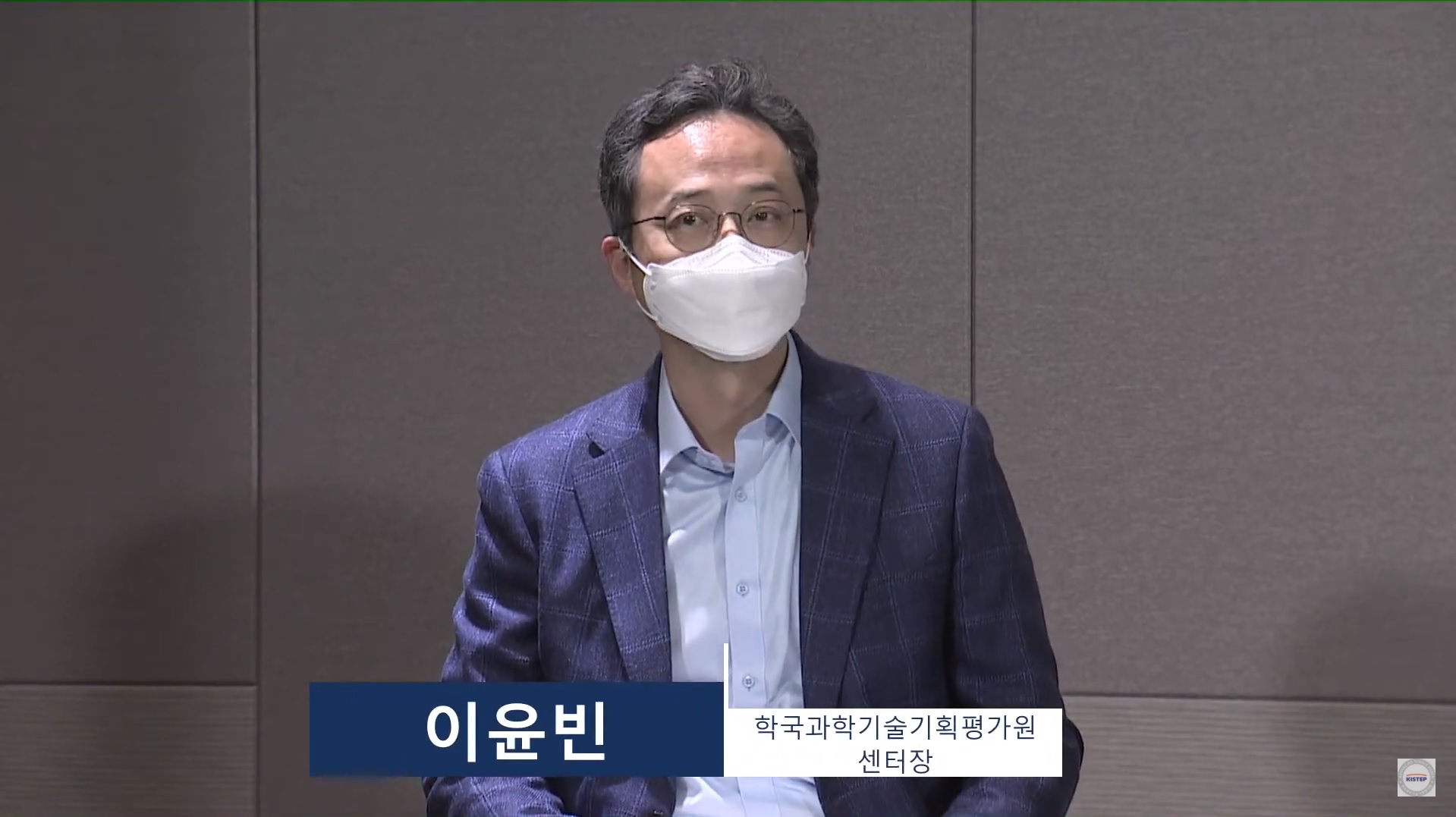
Director Lee (KISTEP) stressed the necessity of making a protocol for data consolidation and measuring it quality because the gap between each data still exists even though data has advanced.
(Replay) https://youtu.be/BR5q07fy-ic

▲ (Opening Address) President Sang-seon Kim (KISTEP)
President Sang-seon Kim (KISTEP) addressed: “The topic ‘Data’ triggered by the 4th Industrial Revolution is explosively spread in the aspect of digital formation caused by COVID-19, so that KISTEP will contribute to the economic growth with higher utilization of R&DI policy data alongside government’s digital new deal.”
Director Yoon-bin Lee (KISTEP) delivered the keynote speech themed ‘current status and future of R&DI policy data’ to introduce one of KISTEP’s intrinsic mission, S&T policy data production.

▲ (Keynote Speech) Yoon-bin Lee (KISTEP)
Director Lee (KISTEP) said that since the amount of data is increasing and demands on data is getting sophisticated, a perspective to utilize data has to be changed like creating new ways to establish data. Equally, he stressed we must not forget the basic premise that data has a limitation although trying to get cooperation with experts and institutions.

▲ Dr. Hyun-ik Lee (KISTEP)
The following presentation was about ‘R&DI Policy and National R&D Investigation and Analysis Data’, which the speaker was Dr. Hyun-ik Lee, an associate research fellow from KISTEP.
The first main presentation was made by Seung-beom Seo (CIS), the head of Innovative Growth Finance Team, and its topic was ‘National R&D and Analysis of Linkage Effect of Policy Finance’. He introduced the result from demonstrating a correlation between national R&D and policy finance and companies’ growth of finance and employment through ‘IGS’ which means a platform for collecting and analyzing policy finance data of innovative growth.

▲ (Presentation1) Team Manager Seung-beom Seo (Korea Credit Information Services, CIS)
According to his presentation analyzing the data collected between 2017 to 2019, the business enterprises which conduct the national R&D with a governmental finance support have a higher rate of its growth about finance and employment, and furthermore, it shows that a governmental finance have a weak mediated effect between R&D and performance.
Secondly, Director Ji-hye Kwon (WISET) gave a presentation, themed ‘Statistics-based HRST Policy on Gender Equality’. She introduced that since the Act on fostering and supporting women scientists and technicians was legislated in 2002, the legal basis of supporting women in S&T was established, so related statistic research and supporting policy have been in progress.

▲ (Presentation2) Ji-hye Kwon (Korea Center for Women In Science, Engineering, and Technology, WISET)
Director Kwon said since HRST policy is based on statistic data, supporting women in S&T policy has a correlation with statistics. In fact, WISET has established an infrastructure for fostering and utilizing women scientists and technicians based on the statistic data such as the survey of utilizing women scientists and technicians in 2005.
Lastly, Sin-hyuk Kang, the associate research fellow from KLI, gave a presentation themed ‘Effect of Governmental R&D Support on Employment’. He utilized the governmental R&D analysis data linked with an employment insurance database for the research.

▲ (Presentation3) Sin-hyuk Kang (Korea Labor Insitute, KLI)
Dr. Kang said: “When analysing the governmental R&D policy, the governmental R&D analysis data linked with other administrative data is definitely precious and helpful resource, so it’s necessary to establish environment to connect various administrative data.”

▲ (Panel Discussion) From left to right, Yoon-bin Lee (KISTEP), Professor Young-Kyoun Oh (Suwon University), (Host) Se-hong Oh (KISTEP), Professor Cheol-woo Baek (Duksung Womens University), Hyun-jun Jung (Korea Information Society Development Insitute, KISDI)
The following panel discussion, Se-hong Oh (KISTEP) hosted it and the panels discussed how to improve and utilize R&DI policy data.

▲ (Panel1) Professor Cheol-woo Baek (Duksung Womens University)
Professor Baek stressed a correlation between data, and he said: “There’s a limitation when using the only data, but if connecting a number of data, diverse analysis can be conducted, so it’s necessary to make a linkage strategy for sensitive resource with existing data benchmarking examples of related utilization.”

▲ (Panel2) Hyun-jun Jung (Korea Information Society Development Insitute, KISDI)
Director Jung (KISDI) highlighted the importance of data with his statement: In the era of 4th Industrial Revolution, utilizing data is not only a mainstream but a requisite. Moreover, he introduced the example of multisource-based statistic research conducted by KISDI, and he commented that data falls into 3 categories: microdata, administrative data, and bigdata.

▲ (Panel3) Professor Young-Kyoun Oh (Suwon University)
Professor Oh (Suwon University) pointed out the performance of S&T includes not only developing new technologies and improving a level of technology but also the added value generated by utilizing S&T data.

▲ (Panel4) Yun-bin Lee (KISTEP)
Director Lee (KISTEP) stressed the necessity of making a protocol for data consolidation and measuring it quality because the gap between each data still exists even though data has advanced.